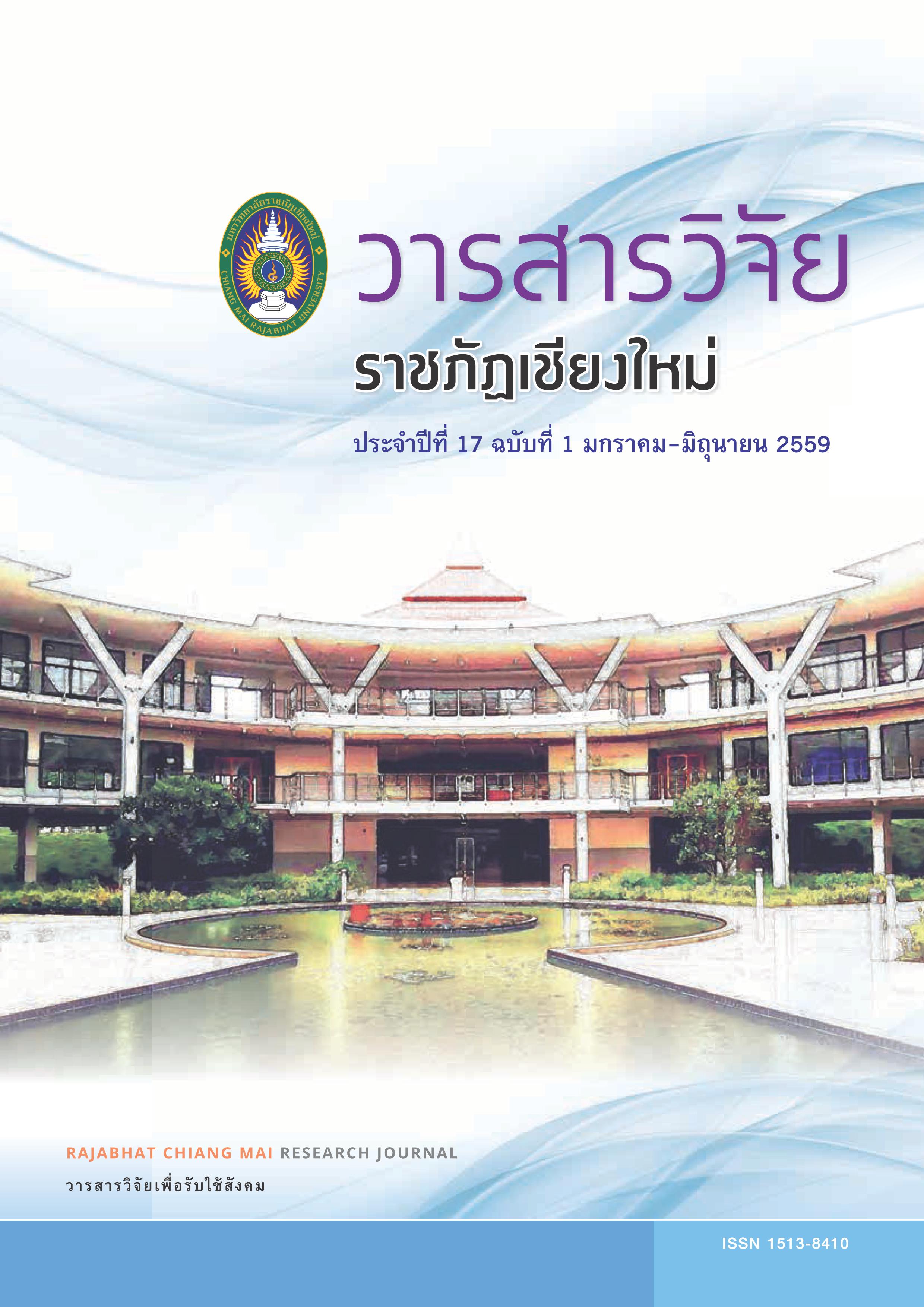Development of Highland Environment Curriculum For Students in Chiang Dao and Chaiprakarn District under Chiang Mai Provincial Office of the Non-formal and Informal Education
DOI:
https://doi.org/10.14456/rcmrj.2016.214985Keywords:
Development of highland environment Curriculum, Lesson Plan, Students under Chiang Mai Provincial Office of the Non-formal and Informal EducationAbstract
The objectives of this research were 1) to study the provisions and problems of highland environment of Chiang dao and Chaiprakarn district in Chiang Mai Province 2) to develop highland environment curriculum for students of Chiang dao and Chaiprakarn district in Chiang Mai Province and 3) to test and compare the learning achievement of highland environment for students of learning centers in Thai hill-tribe community and Office of the Non – formal and Informal Education in Chiang Dao districts for experimental group and Chaiprakarn districts for control group under Chiang Mai Provincial Office of the Non – formal and Informal Education. This testing was conducted by using qualitative research from document interview, community survey, interview and questionnaire for investigating problem conditions of highland environment and ; respondents included, directors, teachers, officials, developer monks, community leaders and students. Tests also measured knowledge, attitudes and behavior for comparing learning achievement pre – test and post – test from primary students of learning centers in Thai hill-tribe community and Office of the Non – formal and Informal Education in Chiang Mai Province (highland) for second semester in academic year 2015, all included 15 districts with 5,237 students and selected Cluster random sampling with 2 districts which were Chiang Dao for experimental and Chaiprakarn for control group.Then used simple sampling by drawing lots in 2 districts for learning centers in Thai hill-tribe community and Office of the Non – formal and Informal Education in Chiang Mai Province both experimental group with 27 students and control group with 25 students. The satisfaction assessment to curriculum analyzed in data with content analysis from interview was performed based on percentage, mean, standard deviation and t –test independent for quantitative research.
The research results showed that :
1.The provisions and problems of highland environment of Chiang Dao and Chaiprakarn districts of Chiang Mai are mostly come from forest and natural resource fertility, then there are environmentally unbalanced problems such as deforestation, forest expanding, forest burning, fog problem, damaged eco – system, hot weather, flood, drought, soil erosion, wildlife reduction and solid waste problem. Solution should be founded in education to cultivate consciousness to participate in the maintenance of the environment and natural resources. The survey of surroundings communities and factors affecting the problems revealed that development of a highland environmental curriculum and integrated cooperative model for maintenance should be the way forward.
2. The result of the highland environmental curriculum development project for students Under Chiang Mai Provincial Official of the Non – formal and Informal Education was the curriculum of 40 hours learning content and an experienced promotional activity 30 hours plan. The curriculum total 70 hours.
3. The results of testing and comparing students learning achievement (correctly and appropriately) were the average scores in terms of knowledge, attitude and behavior of both the experimental and control groups before and after participation different with a statistical significance at .05. That is, students participating in this program had higher in all parts of average scores than those of students who didn’t participate in the program. Additionally, the results of the experimental group’s satisfaction in the curriculum showed that students average were satisfied with participation of curriculum development program at highest level ( = 4.25). It was said that the program of highland environment curriculum development made by the research was a sufficient model to develop students with knowledge, understanding, attitude and consciousness to the environment and natural resource. In conclusion, this curriculum can be used to teach highland environmental awareness for students.
Downloads
References
กรมอุทยานแห่งชาติ สัตว์ป่า และพันธุ์พืช. 2558. ยุทธศาสตร์/มาตรการแก้ไขปัญหาไฟป่าและหมอกควัน ปี 2558. (ระบบออนไลน์). แหล่งข้อมูล: www.dnp.go.th/forestfire/2558/ยุทธศาสตร์_ปี_/2558pdf (9 มีนาคม 2558)
ณัฐวรรธน์ สุนทรวริทธิโชติ และคณะ 2556. รายงานการวิจัยเรื่องการศึกษาสภาพปัญหาสิ่งแวดล้อมในเขตตำบลสามบัณฑิต : ปัจจัยที่มีผลต่อการพัฒนาทรัพยากรธรรมชาติและสิ่งแวดล้อมของประชาชนในตำบลสามบัณฑิต. คณะมนุษยศาสตร์และสังคมศาสตร์ มหาวิทยาลัยราชภัฎพระนครศรีอยุธยา.
ธานินทร์ ศิลป์จารุ. 2555. การวิจัยและวิเคราะห์ข้อมูลทางสถิติด้วย SPSS และ AMOS. นนทบุรี: บริษัท เอส. อาร์. พริ้นติ้ง แมสโปรดักส์ จำกัด.
มหาวิทยาลัยเชียงใหม่ สถาบันวิจัยสังคม. 2557. แนวทางการจัดการทรัพยากรบริเวณลุ่มน้ำแม่เสาะ-แม่เลา. (ระบบออนไลน์). แหล่งข้อมูล: www.sri.cmu.ac.th/-srilocal/research_a/DATA/31_A.html (10 มกราคม 2559)
รุ่งทิพย์ บำรุงสุข. 2555. ปัจจัยที่ส่งผลต่อการจัดการสิ่งแวดล้อม : กรณีศึกษาเขตลุ่มน้ำแม่กลอง อำเภอเมือง จังหวัดสมุทรสงคราม. การค้นคว้าอิสระ บริหารธุรกิจมหาบัณฑิต วิชาเอกการจัดการทั่วไป คณะบริหารธุรกิจ มหาวิทยาลัยเทคโนโลยีราชมงคลธัญบุรี.
ศรีสุวรรณ เกษมสวัสดิ์. 2553. ผลของการจัดกิจกรรมการเรียนรู้แบบมีส่วนร่วมในรายวิชาสิ่งแวดล้อมกับการพัฒนาที่ยั่งยืนที่มีต่อพฤติกรรมการอนุรักษ์สิ่งแวดล้อมในมหาวิทยาลัยราชภัฎสวนสุนันทา สำหรับนักศึกษาชั้นปีที่ 1-3 สาขาวิชาวิทยาศาสตร์สิ่งแวดล้อม. (ระบบออนไลน์). แหล่งข้อมูล: www.ssruir.ac.th/bitstream/ssruir/406/1/163-53-1.pd (10 มกราคม 2559)
สุพจน์ สาริบุตร. 2556. ความพึงพอใจของนักเรียนที่มีต่อการจัดสิ่งแวดล้อมในโรงเรียนเถินวิทยา. (ระบบออนไลน์). แหล่งข้อมูล: http ://e–article.plu.ac.th/files/2556/EDU/EDU560406.pdf (29 มีนาคม 2559)
สุภาพร พรไตย. 2557. การพัฒนาผลสัมฤทธิ์ทางการเรียนเรื่องชีวิตกับสิ่งแวดล้อมด้วยการจัดการเรียนรู้แบบสืบเสาะวิทยาศาสตร์ที่เน้นการคิดวิเคราะห์. (ระบบออนไลน์). แหล่งข้อมูล: ejournals.swu.ac.th/index.php/JSTEL/article/view/4254 (15 มีนาคม 2558)
อุไรวรรณ หาญวงค์. 2551. การพัฒนาหลักสูตรสิ่งแวดล้อมท้องถิ่นที่บูรณาการวิธีการสอนแบบเน้นกระบวนการ สำหรับนักเรียนที่เรียนในกลุ่มคละระดับชั้น. วิทยานิพนธ์ ศึกษาศาสตรดุษฎีบัณฑิต สาขาหลักสูตรและการสอน มหาวิทยาลัยเชียงใหม่.
Downloads
Published
How to Cite
Issue
Section
License
1. Articles, information, content, images, etc published in the “Community and Social Development Journal” are copyrighted by the Community and Social Development Journal, Chiang Mai Rajabhat University. In order to properly distribute the articles through print and electronic media, the authors still hold the copyright for the published articles under the Creative Commons Attribution (CC BY) license, which allows the re-distribution of the articles in other sources. References must be made to the articles in the journal. The authors are responsible for requesting permission to reproduce copyrighted content from other sources.
2. The content of the articles appearing in the journal is the direct responsibility of the article authors. The editorial board of the journal does not necessarily agree with or share any responsibility.














